Events and Parties
Editors Picks: 17 Things Not to Miss in New York’s Art World This Week
The art world returns from winter break.
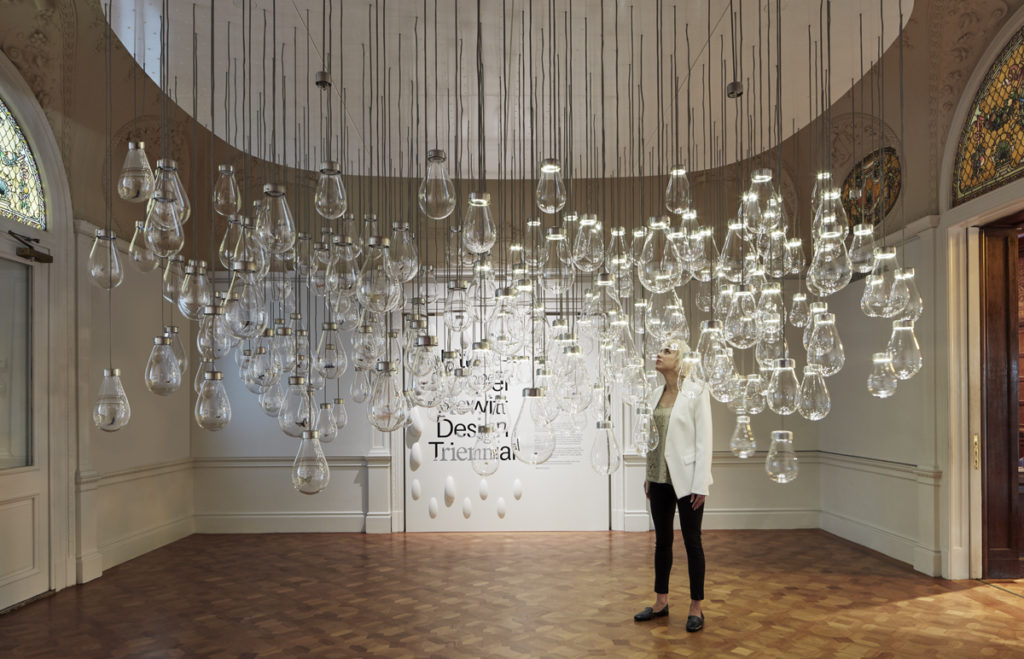
The art world returns from winter break.

Artnet News

Each week, we search New York City for the most exciting and thought-provoking shows, screenings, and events. See them below.
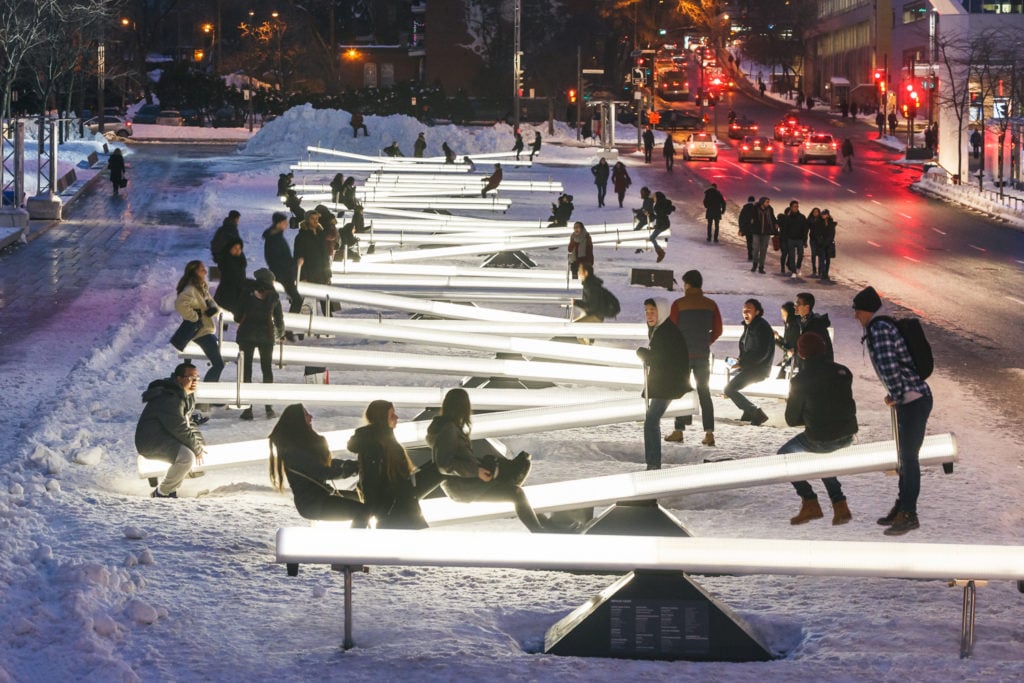
Lateral Office and CS Design in collaboration with EGP Group, Impulse. Photo courtesy of the Garment District Plaza.
1. “Impulse” at the Garment District Plazas
The Garment District’s Art on the Plazas program has closed a block of Broadway to cars for the month of January, allowing the public to enjoy “Impulse,” an interactive installation of 12 light-up seesaws. The piece, by architecture firms Lateral Office and CS Design (in collaboration with structural engineers EGP Group), debuted in 2015 at Luminothérapie in Montreal and features musical elements from sound designer Mitchell Akiyama. This oversize playground equipment aims to appeal to your inner child, and should warm the heart of even the most jaded New Yorkers as we prepare for the inevitable post-holiday deep freeze.
Location: The Garment District Plazas, Broadway between 37th and 38th Streets
Price: Free
Time: Open daily, at all times
—Sarah Cascone
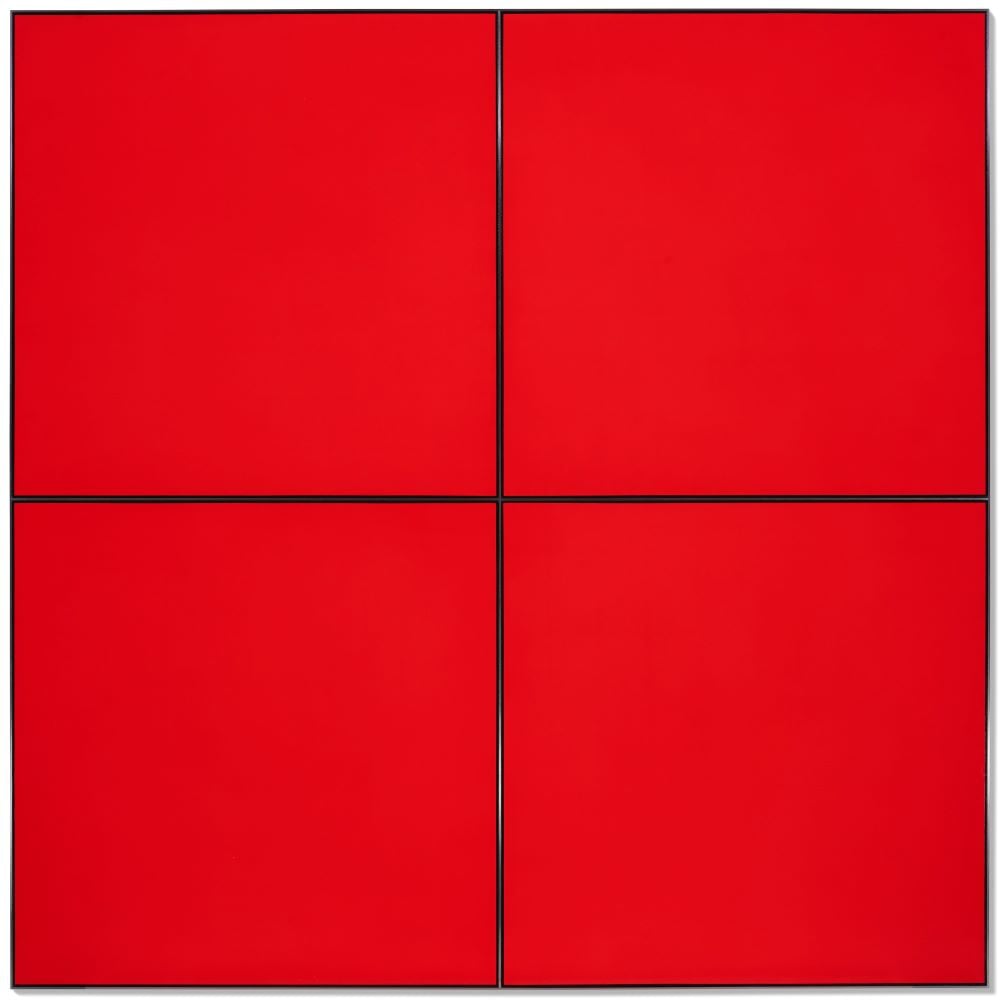
Tadaaki Kuwayama, Untitled (1968–69). Image courtesy of the artist and Christie’s Images Ltd.
2. Two private selling exhibitions featuring Tadakki Kuwayama and Rakuko Naito at Christie’s
Christie’s kicks off the year with two private selling exhibitions featuring the work of Tadaaki Kuwayama and Rakuko Naito with works on view at its Rockefeller Center headquarters from January 8–17. The two artists have been married for more than 60 years and moved from Tokyo to New York in 1958. Keeping separate practices, each artist expresses a minimalist aesthetic using his or her own unique lens—Kuwayama is focused on mechanically manufactured surfaces that conceal the artist’s hand, while Naito centers her practice on the possibilities of natural forms and the fragility of her chosen medium, rice paper.
Location: Christie’s 20 Rockefeller Plaza, New York
Price: Free with RSVP
Time: Opening reception, 6 p.m.–8 p.m.; Monday–Saturday, 10 a.m.–5 p.m., Sunday 1 p.m.–5 p.m.
—Eileen Kinsella
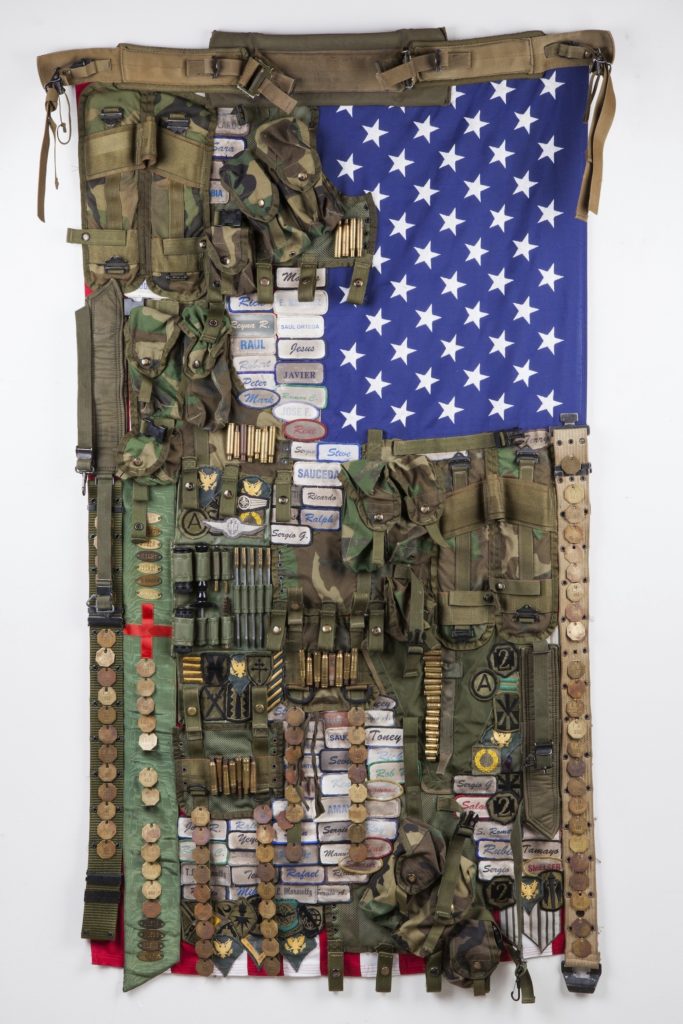
Sara Rahbar, Flag #12 Land of Opportunity (2008–13). Photo courtesy of FACTION Art Projects.
3. “Oh Say, Can You See” Curator Talk at Gallery 8
Curator Natasha Becker will give a talk about the latest exhibition organized by Harlem art collective FACTION Art Projects, with artists Khalil Robert Irving, Sara Rahbar, and Daapo Reo. The show, on view through January 9, is a public art installation in the gallery windows in which each artist remakes the American flag based on their own personal experiences. Rabar, who is Iranian, has embellished the flag with vintage military gear; Irving has punctured each star with a single bullet hole in commemoration of the assassinations of Martin Luther King Jr. and Malcolm X, and Reo has crafted his flag out of African textiles.
Location: Gallery 8, FACTION Art Projects, 2602 Frederick Douglass Boulevard
Price: Free
Time: 5:30 p.m.–7:30 p.m.
—Sarah Cascone
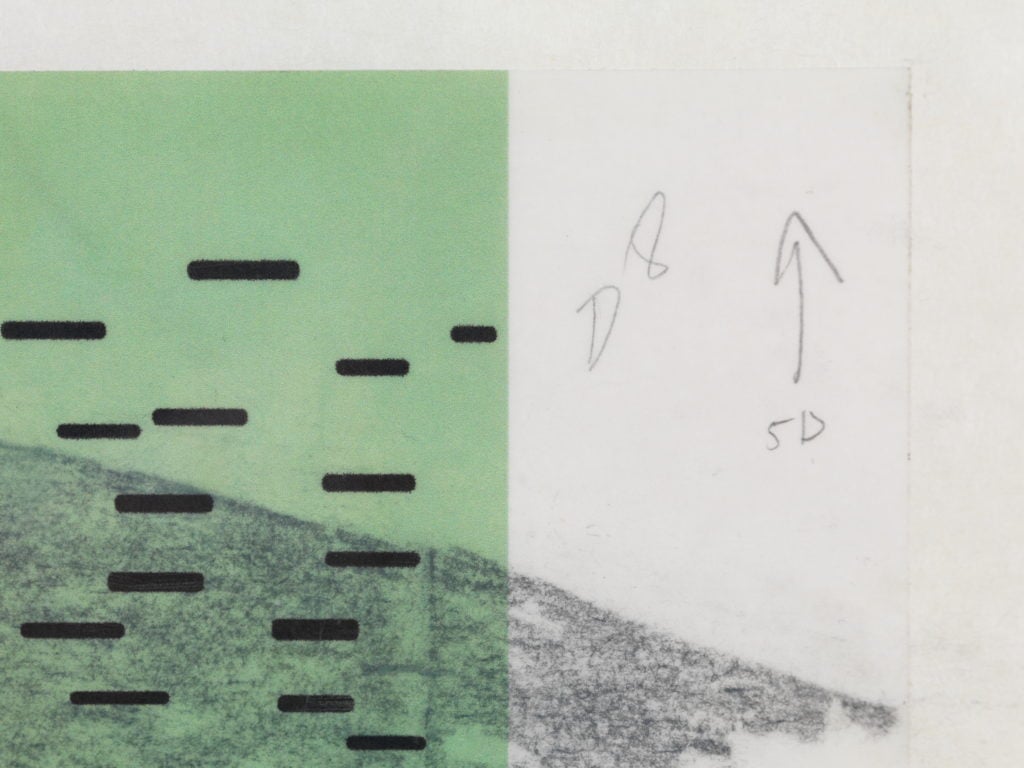
María Elena González T2 5-8 (2015), detail. Courtesy of the artist and Hirschl & Adler Modern, New York.
4. Book launch: Maria Elena Gonzalez “Tree Talk” at Hirschl & Adler Modern
Artist Maria Elena Gonzales celebrates the release of her new book Tree Talk, which is based on a 12-year project that involved translating the marks that appear on birch bark into compositions for the player piano.
Location: Hirschl & Adler Modern, the Fuller Building, 41 East 57th Street
Price: Free
Time: 5 p.m.–7 p.m.
—Sarah Cascone
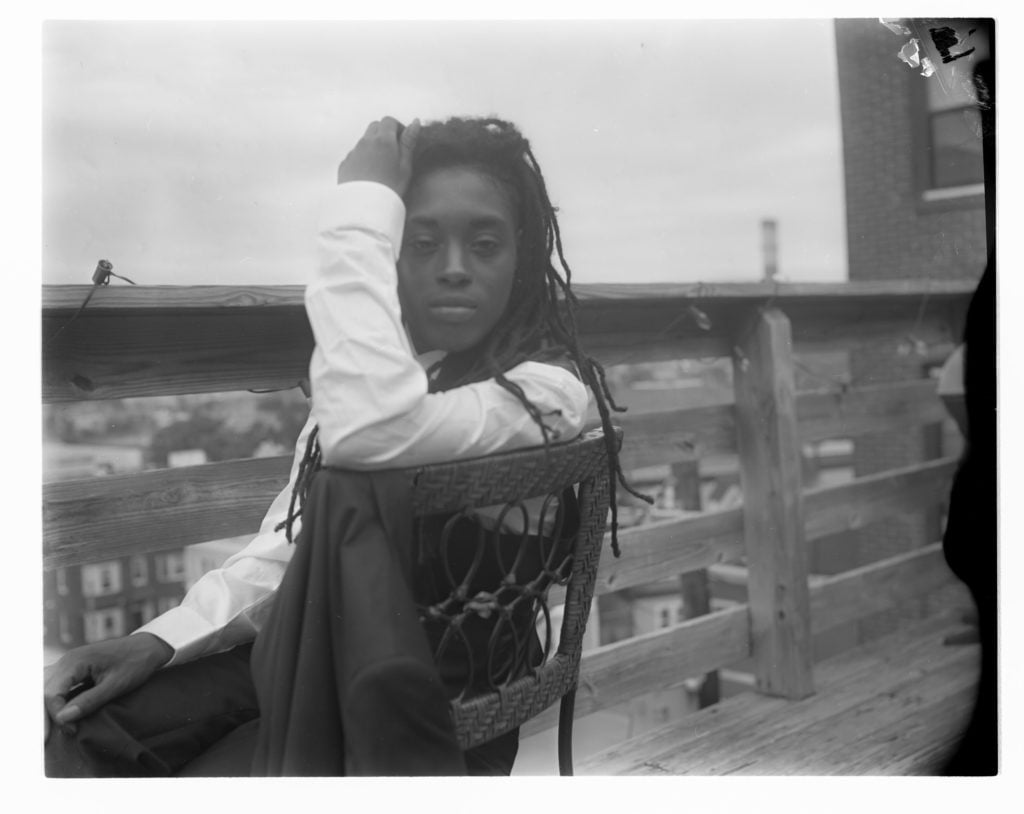
Felicita Felli Maynard, Jean in Boston from the “Ole Dandy” series (2019). Photo courtesy of Pen + Brush.
5. “The Now” at Pen + Brush
This group show from Hannah Layden, Felicita Maynard, Rowan Renee, and Beatrice Scaccia considers questions of personal identity, and what it means to be the “Other.” Maynard, for instance, looks to recreate lost histories of queer African Americans through her photography, while Renee reclaims their own personal image in the series “Together but Separate,” based on low-resolution versions of nude photographs which they lost in a legal battle with a former partner.
Location: Pen + Brush, 29 East 22nd Street
Price: Free
Time: Opening reception, 6 p.m.–8 p.m.; Tuesday–Saturday, 12 p.m.–6 p.m.
—Sarah Cascone
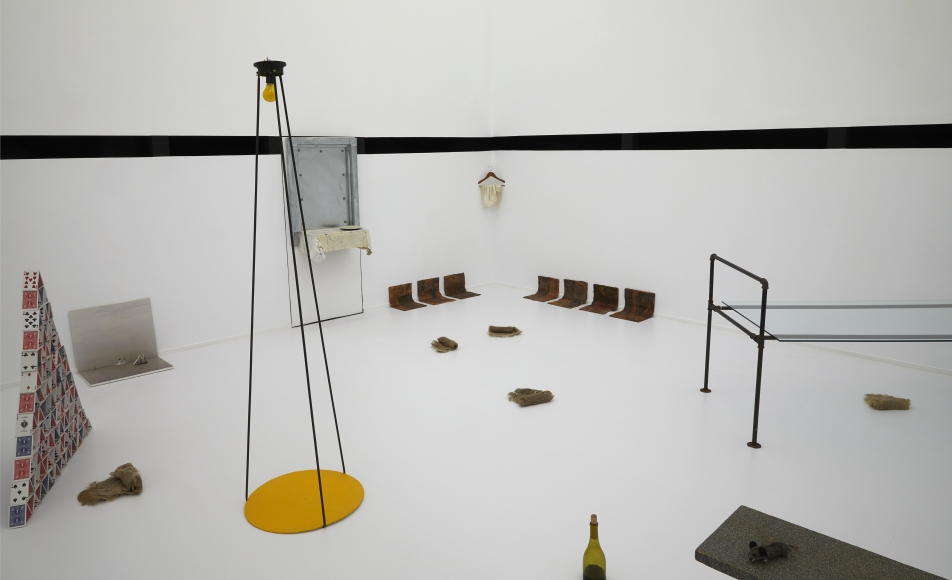
Luis Camnitzer, El Mirador (1996). Photo courtesy of Museo Nacional Centro de Arte Reina Sofía, Madrid, Spain, Photo: Román Lores and Joaquín Cortés.
6. “Luis Camnitzer” at Alexander Gray Associates
Originally presented at the São Paulo Biennial in 1996, Luis Camitzer’s room-sized installation El Mirador can only be viewed through a tiny opening, the starkly lit space suggesting an isolated prison cell. The piece can be interpreted in a variety of ways, but is colored by Camnitzer’s examination of the effects of military dictatorship in his native Uruguay between 1973 and ’84. “In the end everything is a prison: the body, the limits of intelligence and imagination, the limits of society,” he says in his artist’s statement. “The real prison is an example of an infinite number of prisons. We are always carrying around a prison, wearing it like a suit.”
Location: Alexander Gray Associates, 510 West 26 Street
Price: Free
Time: Opening reception, 6 p.m.–8 p.m.; Tuesday–Saturday, 10 a.m.–6 p.m.
—Sarah Cascone
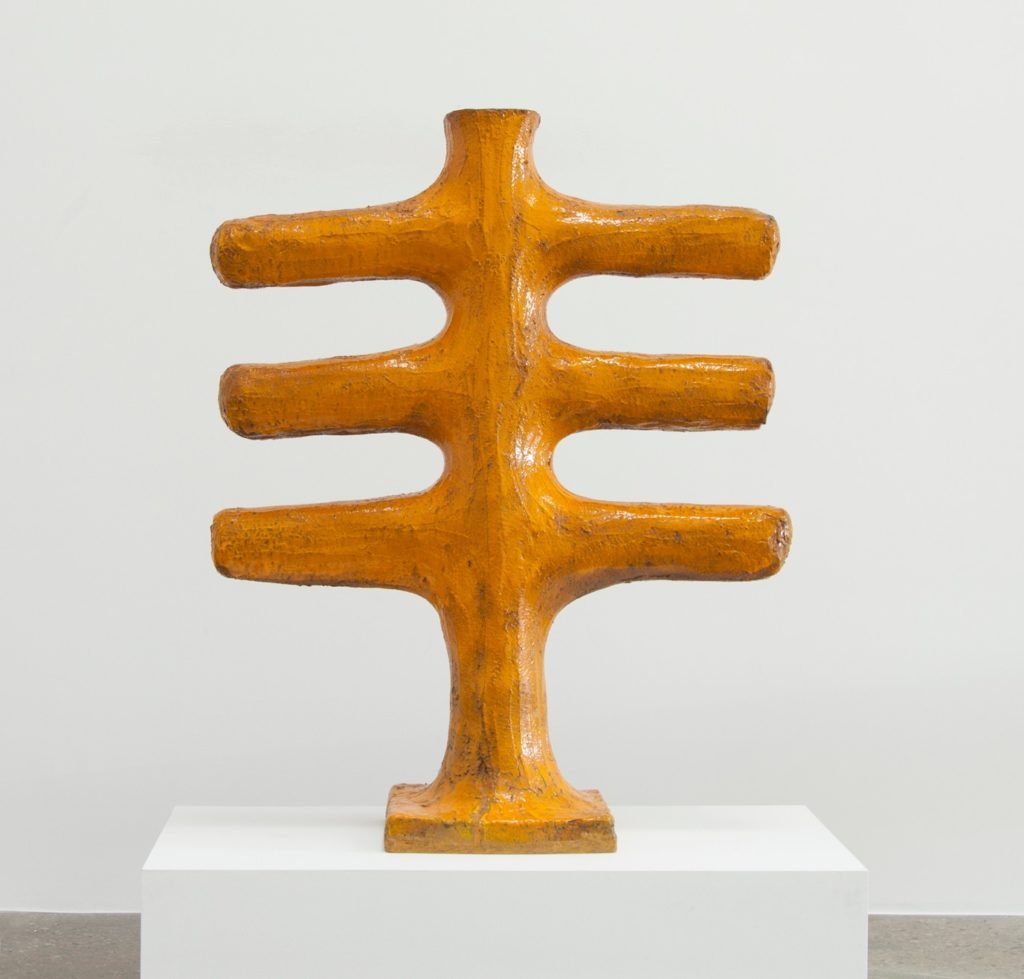
John Mason, Orange Cross (1963). Photo courtesy of Gagosian, ©1963 estate of John Mason.
7. “John Mason: Geometric Force” at Gagosian
The late ceramicist John Mason got his start in the 1950s, pushing his chosen medium—traditionally relegated to a small, decorative scale—to the limits with his large, abstract wall reliefs. Mason developed unique techniques to take his practice to the next level, keeping clay soft and malleable beyond its normal lifespan with the aid of industrial humidifiers from fruit packing plants, and building a custom, oversize kiln that could fire pieces of up to two tons and six feet in height.
Location: Gagosian Park & 75, 821 Park Avenue
Price: Free
Time: Opening reception, 6 p.m.–8 p.m.; Monday–Saturday, 10 a.m.–6 p.m.
—Sarah Cascone
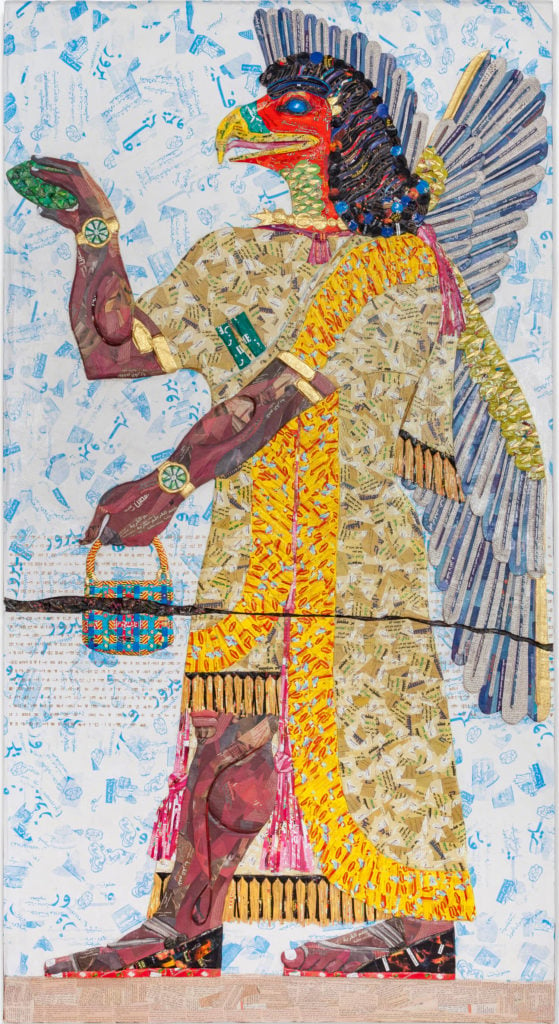
Michael Rakowitz, The invisible enemy should not exist (Room G, Panel 22), 2018. Photo courtesy of Jane Lombard.
8. “Michael Rakowitz: The invisible enemy should not exist (Room F, section 1, Northwest Palace of Nimrud” at Jane Lombard Gallery
Jane Lombard hosts the New York debut of Michael Rakowitz’s film The Ballad of Special Ops Cody, as well as his recreations of National Museum of Iraq artifacts destroyed or looted during the 2003 US invasion, made with unexpected materials such as Middle Eastern food packaging and Arabic newspapers.
Location: Jane Lombard Gallery, 518 West 19th Street
Price: Free
Time: Opening reception, 6 p.m.–8 p.m.; Tuesday–Saturday, 10 a.m.–6 p.m.; Saturday, 11 a.m.–6 p.m.
—Sarah Cascone
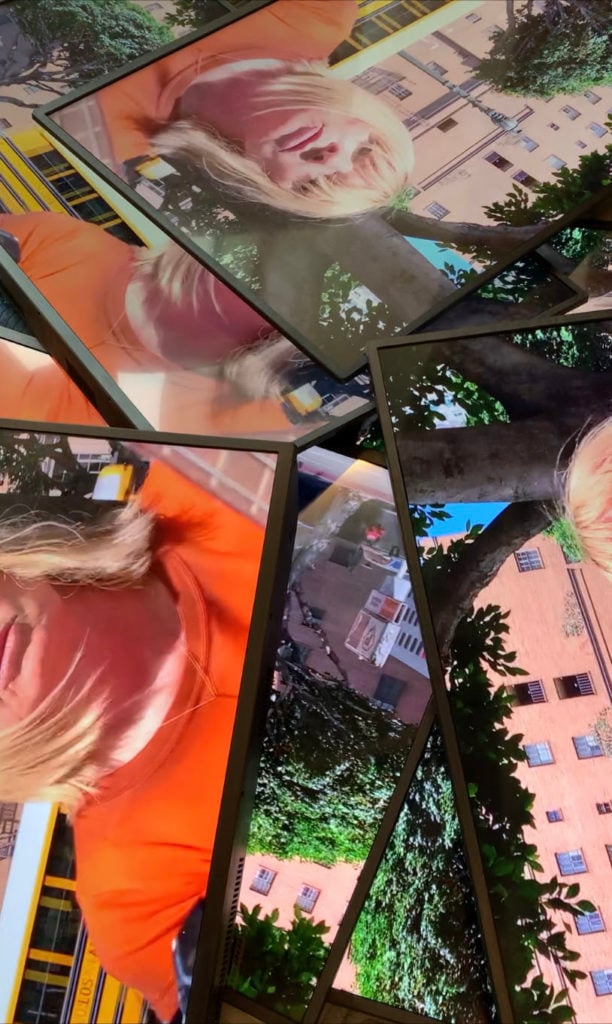
Installation view, Kim Gordon, Los Angeles June 6, 2019 (2019). Image courtesy of the artist and 303 Gallery.
9. “Kim Gordon: The Bonfire” at 303 Gallery
For her second solo show at 303 Gallery, former Sonic Youth singer Kim Gordon presents a new body of work, canvases that seemingly present a world of safety and intimacy but beneath which lurk darker unseen forces. Photos of a group of revelers gathered around a beach bonfire are overlaid with digital frame marks that suggest surveillance technology or facial recognition software. These images reflect our current reality where it seems no image is uncaptured, as well as the fact that even the most ordinary events are packaged and elevated as though they have more monumental meanings.
Location: 303 Gallery, 555 West 21st Street, New York
Price: Free
Time: Opening reception, 6 p.m.–8 p.m.; Tuesday–Saturday, 10 a.m.–6 p.m.
—Eileen Kinsella
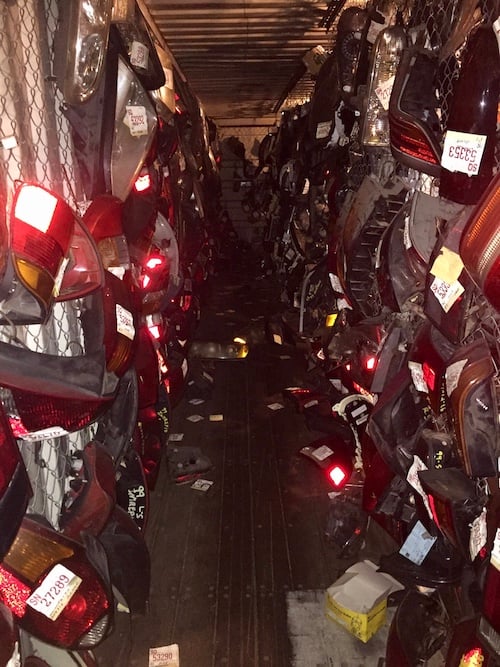
Photo courtesy Bortolami.
10. “Madeline Hollander: Heads/Tails” at Bortolami
The block of Walker Street between Church and Broadway is one of the busiest in Tribeca. Traffic’s often bottle-necking, as waves of cars try to turn right on Manhattan’s most ancient thoroughfare, or move east and flow down to the Brooklyn-bound bridges. And it’s all regulated by a calibrated sequence of traffic signals, as the city tries to corral the motives of its drivers and create order on the world’s most famous island. It’s this push and pull and push—between human desire to move, the use of technology to act as propulsion, and the overlord’s machinations toward control—that has inspired the dancing lights of Madeline Hollander’s new show, “Heads/Tails,” presented by Bortolami at 55 Walker Street. Best known for elaborate choreographed dance performances involving human participants (or, in the case of her collaboration with Urs Fischer, twirling office swivel chairs) Hollander here uses headlights and taillights taken from dead cars, and pipes in data about the very much alive cars coming down that busiest of intersections, right outside the gallery. The lights come on when a car comes, 24 hours a day, so the show can track in real time the way that movement is controlled by the traffic gods—and, sometimes, the way the cars defy the traffic gods by speeding through that yellow that might have been a red.
Location: Bortolami, 55 Walker Street
Price: Free
Time: Opening reception, 6 p.m.–8 p.m.; Tuesday–Saturday, 10 a.m.–6 p.m.
—Nate Freeman
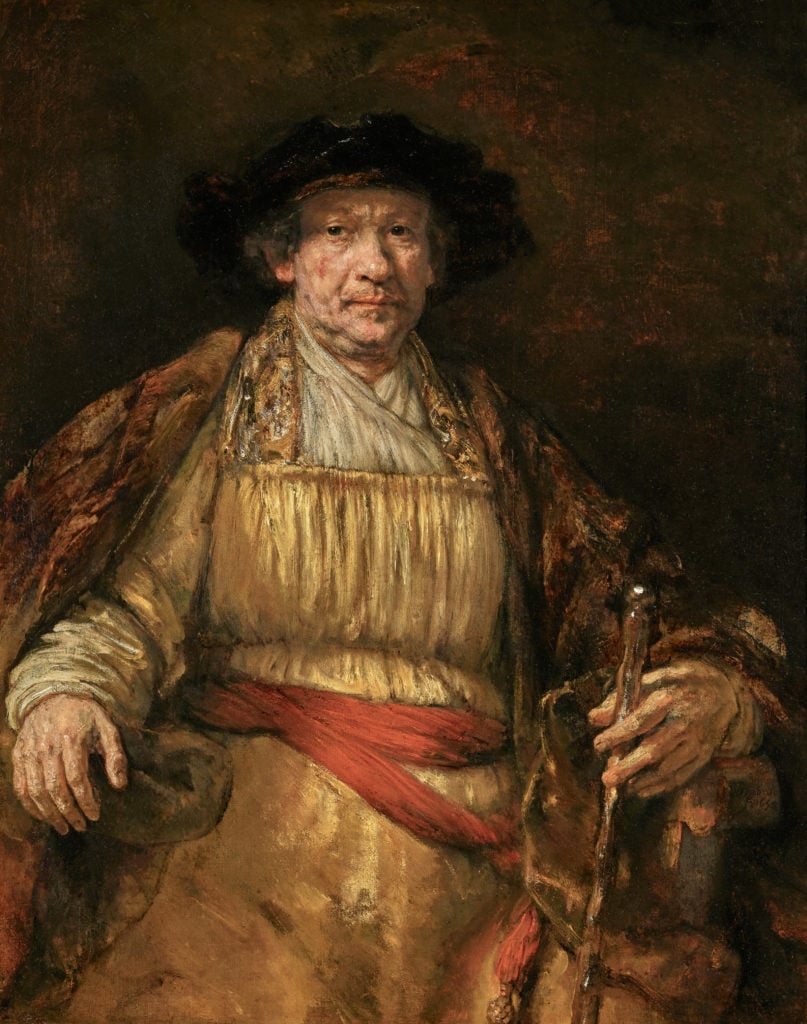
Rembrandt van Rijn, Self-Portrait (1658). Courtesy of the Frick Collection.
11. “Frick Perspectives: Lessons from the Dutch ‘Golden Age’” at the Frick Collection
The Frick kicks off a four-part lecture series given by alumni of its Curatorial Fellows program with Adam Eaker of the Metropolitan Museum of Art, who will consider the appeal of Dutch art for the well-heeled collectors of Gilded Age New York. The series continues with “The Glint of Gold: Early Italian Pictures” on January 25, “Impressed by Degas, Monet, Renoir” on February 8, and “Northern Lights,” about the Netherlandish and French Renaissance paintings in the museum’s collection, on February 22.
Location: The Frick Collection, 1 East 70th Street
Price: $30, or $100 for tickets to all four lectures (cost includes museum admission)
Time: 12 p.m.
—Sarah Cascone
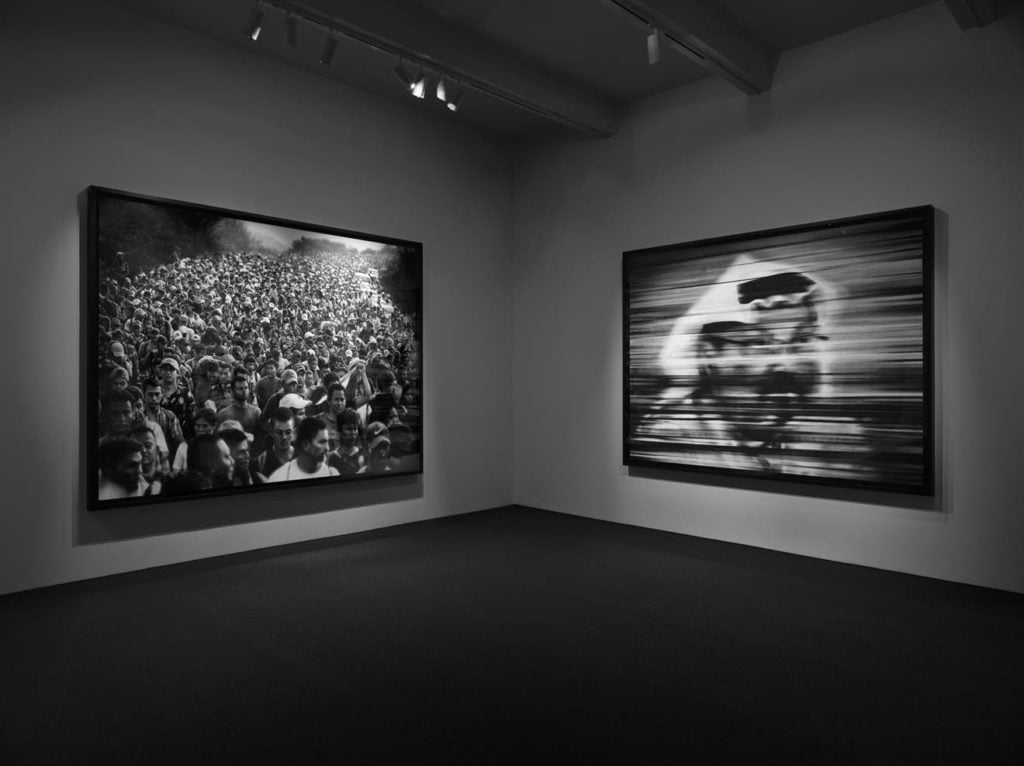
“Robert Longo: Fugitive Images” installation view, 2019. Photo courtesy of Metro Pictures, New York.
12. “In Conversation: Robert Longo and Nancy Spector” at Metro Pictures
Robert Longo will speak with Guggenheim chief curator and artistic director Nancy Spector about his current exhibition “Fugitive Images” (on view through January 18), and the artist’s eight new monumental hyperrealistic charcoal images. They are part of Longo’s ongoing “Destroyer Cycle” series, inspired by what he sees as the destructive forces of power and greed at work in our current political climate.
Location: Metro Pictures, 519 West 24th Street
Price: Free
Time: 1 p.m.
—Sarah Cascone
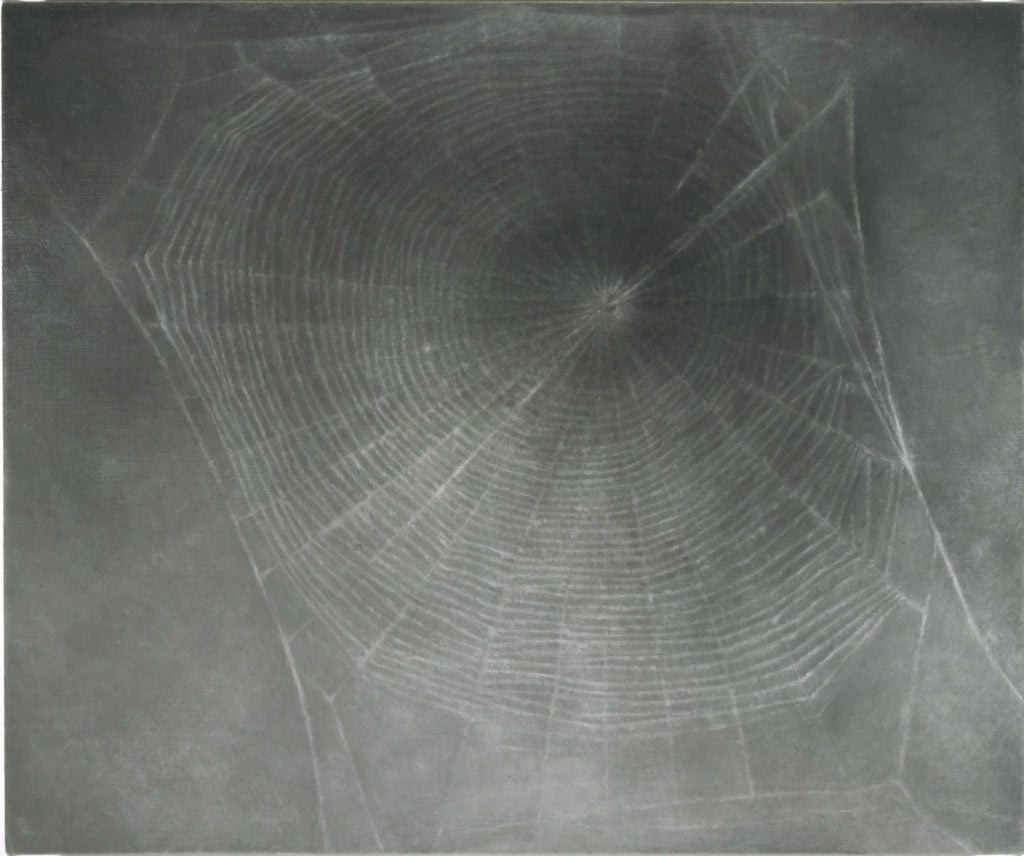
Vija Celmins, Web #3 (2000–2002). The Museum of Modern Art, New York, gift of Edward R. Broida, 2005 © Vija Celmins, courtesy the artist and Matthew Marks Gallery.
13. “Vija Celmins: To Fix the Image in Memory” at the Met Breuer
Only a few days remain to see Vija Celmins’s quiet yet forceful retrospective uptown. The exhibition brings together close to 120 works spanning six decades, two coasts, and multiple media. From everyday objects in her early studio in Venice, to the lapping waves of the Pacific Ocean, to interpretations of newspaper pages and scientific findings, Celmins’s virtuoso depictions manage to transcend technical expertise and deliver a glimmer of transcendence.
Location: The Met Breuer, 945 Madison Avenue
Price: Adults, $25; seniors, $17; students, $12; children age 12 and under, free
Time: Tuesday–Thursday, 10 a.m.–5:30 p.m.; Friday–Saturday: 10 a.m.–9 p.m.; Sunday, 10 a.m.–5:30 p.m.
—Tim Schneider
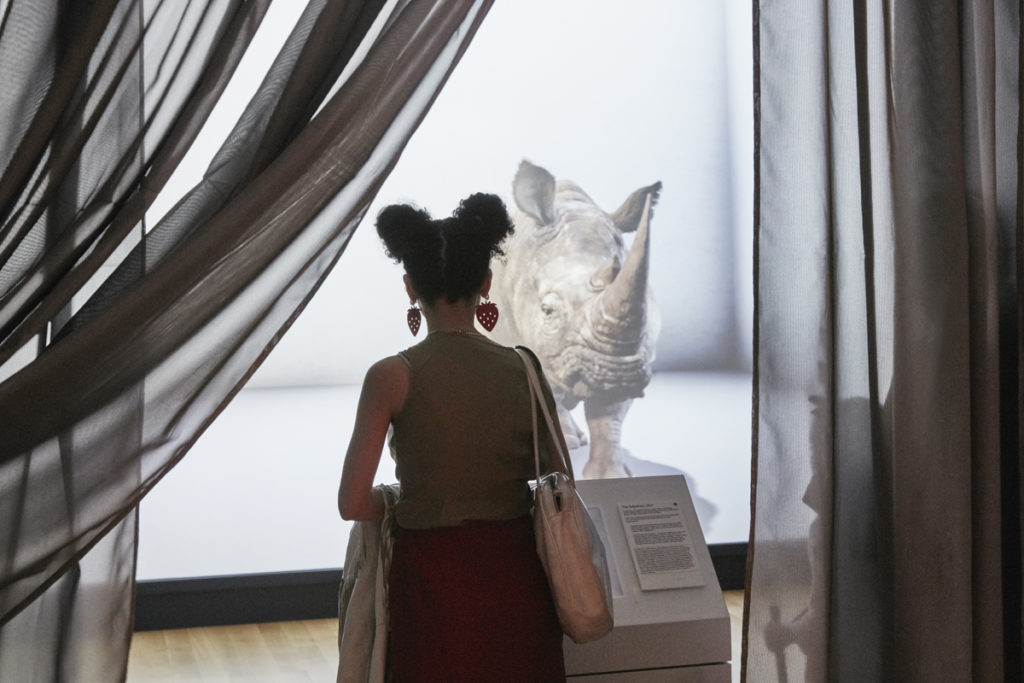
A visitor to “Nature—Cooper Hewitt Design Triennial” experiences The Substitute a CG animation and visualization of the extinct male northern white rhino created by The Mill, with behavior based on research by DeepMind. Alexandra Daisy Ginsberg (2019). Photo by Thomas Loof.
14. “Nature—Cooper Hewitt Design Triennial With Cube Design Museum” at the Cooper Hewitt
In its current triennial, the Cooper Hewitt considers the broader implications of design, with some 60 examples of projects designed to work in harmony with nature and maybe even help combat climate change. These are designers harnessing the power of yeast and algae, and reusing existing products in unexpected ways, like a filter that removes microplastics from the oceans. It’s an exhibition at the intersection of science, technology, art, and design that offers a tantalizing glimpse of a possible future where mankind lives in harmony with the earth, rather than pushing it to the brink of destruction. (The exhibition’s smaller first floor gallery stays open an extra week, until January 20.)
Location: Cooper Hewitt, Smithsonian Design Museum, 2 East 91st Street
Price: General admission $18
Time: Tuesday, 10 a.m.–8 p.m.; Wednesday–Monday, 10 a.m.–6 p.m.
—Sarah Cascone
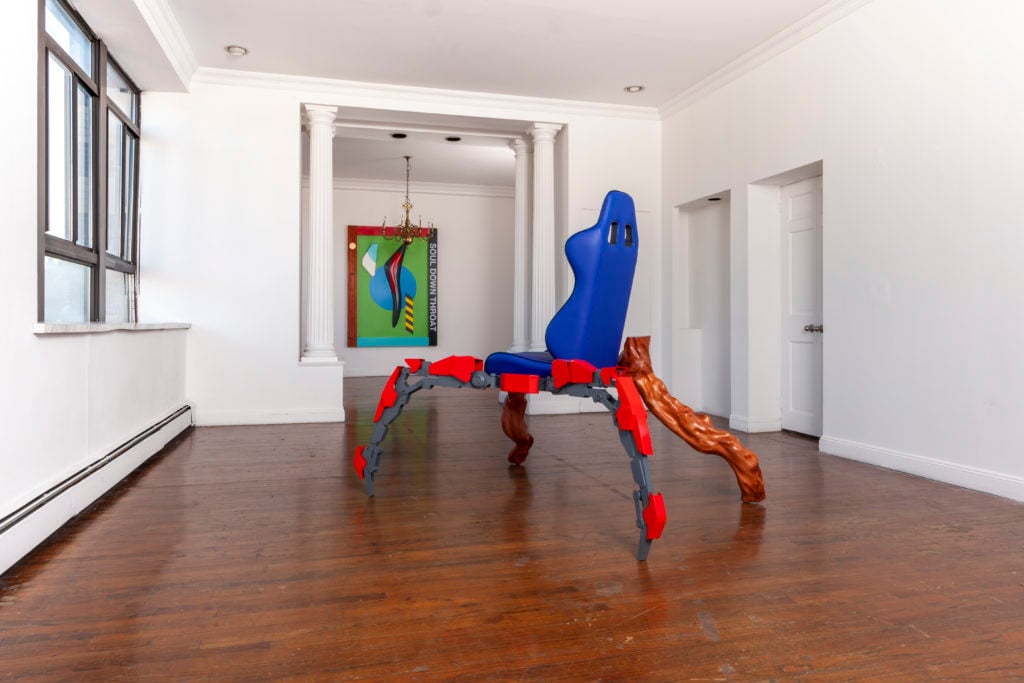
Nik Kosmas, Installation view: Bodyhunter: Monist Crysis, Alyssa Davis Gallery. Courtesy of Alyssa Davis Gallery.
15. “Nik Kosmas Bodyhunter: Monist Crysis,” at Alyssa Davis Gallery
Make it a #2020resolution to visit galleries that require a little more effort, namely those for which you must book an appointment. The Nik Kosmas show at Alyssa Davis Gallery, which closes this Sunday, is the perfect introduction to the world of premeditated and intimate gallery visits. Kosmas’s brightly colored sculptural works look delightfully extraterrestrial in Davis’s solarium. There are just two pieces in the exhibition yet they deliver such powerful narratives. Here’s mine: It’s the year 2120. Aliens have colonized Earth. A member of the almost extinct human race seeks shelter in an abandoned apartment. He is greeted by Bio-Mech Chair: 50 percent Transformer, 50 percent Chippendale, 100 percent painful reminder of a culture long gone. As he leaves, he notices the violent message in Soul Down Throat. It becomes an afterimage in his eyes for about 10 seconds (end narrative). Now, if you want another version of it, you’ll have to ask Alyssa!
Location: Alyssa Davis Gallery, 2 Cornelia Street
Price: Free
Time: By appointment only
—Cristina Cruz
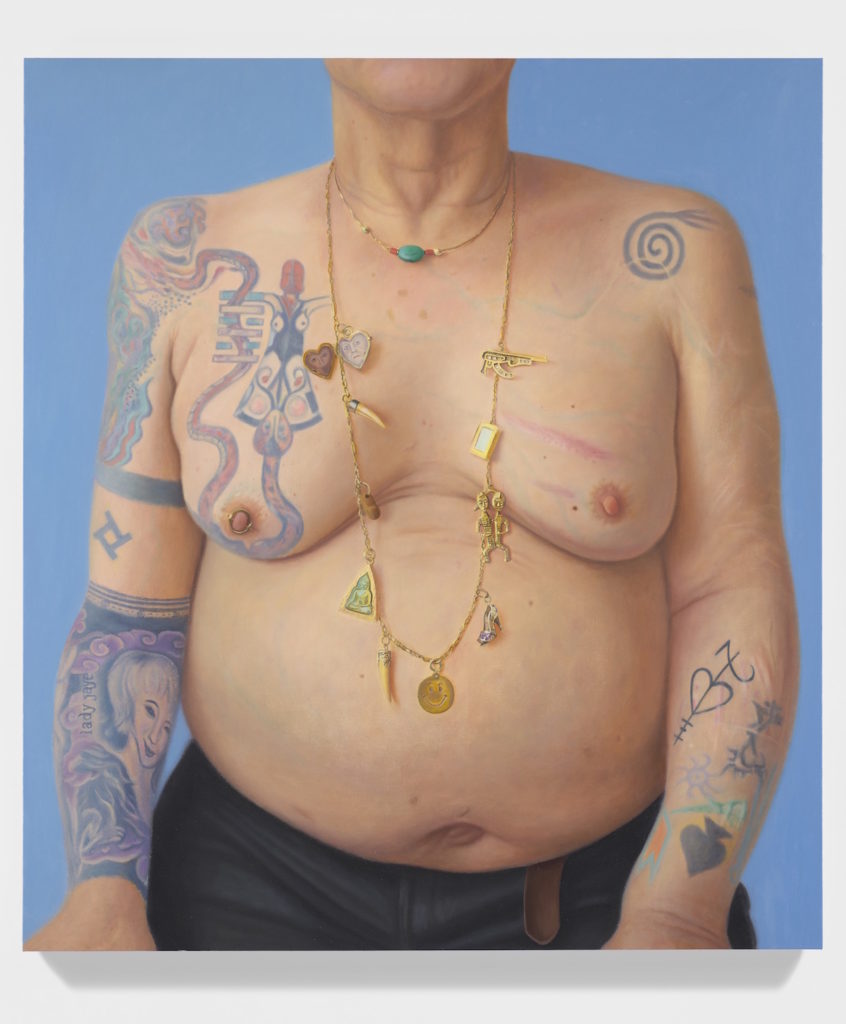
Clarity Haynes, Genesis (2019). Courtesy of the artist and Denny Dimin Gallery.
16. “Clarity Haynes: Altar-ed Bodies” at Denny Dimin Gallery
For her new show at Denny Dimin, Haynes hones in on the alter as a metaphor for change, the exchange of power, and a reclaiming of “domestic art.” In a series of still life paintings, she depicts her own ad hoc altars, each populated with homespun totems and quirky keepsakes cobbled together over the years. In an unexpected way, the canvases also complement the artist’s studies of torsos (new examples of which are also in the show).
Location: Denny Dimin Gallery, 39 Lispenard Street
Price: Free
Time: Tuesday–Saturday, 11 a.m.–6 p.m.
—Taylor Dafoe
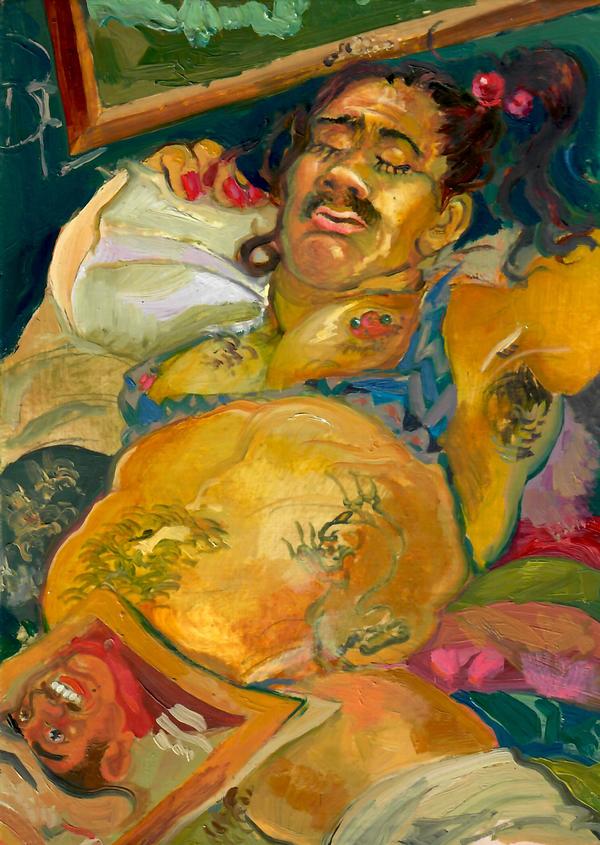
Noelle Velez, Bikini Boy 2 (2019). Courtesy of Underdonk Gallery.
17. “Reclining Dude” at Underdonk
In art history, a reclining nude has historically implied the female figure. This three-person show featuring Sam Crohn, Noelle Velez, and Keisha Prioleau-Martinre re-imagines the conceit in a series of paintings that in various ways upend gender roles, showing figures that are vulnerable, at ease, and unconventionally sexual.
Location: Underdonk, 1329 Willoughby Ave #211
Price: Free
Time: Saturday–Sunday, 1 p.m.–6 p.m., and by appointment
—Katie White